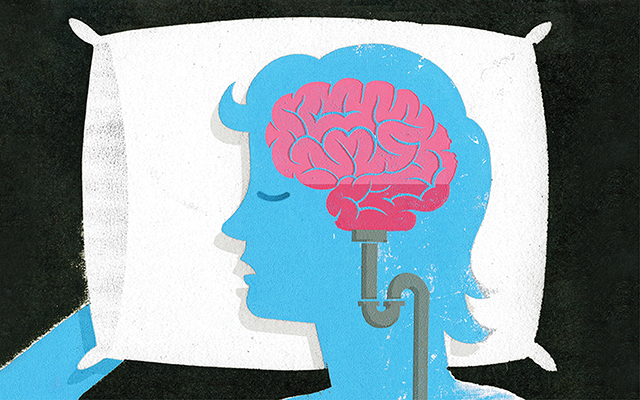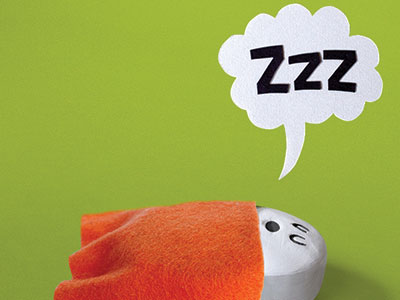Sleep is often the first casualty of our busy lives. We cut out an hour here and there in our quest to fit more into the day, working on the assumption that sleep is unproductive.
“I might be wiped out tomorrow,” we think, “but if I stay up a little later, I can accomplish more.”
To pass sleep off as an extended stretch of downtime is to dangerously mischaracterize it. Far from being at total rest during sleep, our bodies are intensely busy: While our waking minds go on autopilot, some of our bodies’ most sophisticated mechanisms rev up to do the hard work of repairing and maintaining nearly every aspect of our physiology and psychology.
To pass sleep off as an extended stretch of downtime is to dangerously mischaracterize it.
For this reason, sleep is vital for sustaining peak mental performance, stabilizing mood, bolstering immunity, coping with stress, repairing cells, rebalancing our biochemistry, and maintaining a healthy metabolism.
Hundreds of biological processes occur while we snooze — all of which allow us to be more productive, alert, and healthy during waking hours.
“Sleep is a biological imperative,” says Mark Mahowald, MD, neurologist and Stanford University adjunct professor of psychiatry and behavioral sciences. “It is not negotiable. Any degree of sleepiness will impair performance and mood.”
Apparently, many Americans have not yet taken this wisdom to heart. According to a poll by the National Sleep Foundation, nearly a third of adults complain that daytime sleepiness interferes with their lives.
So, those of you stumbling along among your fatigued ranks, know that skimping on sleep will not get you ahead — not now, not ever.
In fact, getting too little sleep can undermine your productivity and effectiveness, starting from the moment you begin running a deficit. And it can set you up for serious health consequences down the road.
Want to know more about sleep’s critical role in your health and happiness? Make the following your bedtime reading, and by tomorrow you’ll be putting sleep at the top of your to-do list.
7 Reasons Why Sleep Is Essential for Your Health
1) Sleep & the Brain
Sleep is vital for keeping us mentally sharp and alert. Neurocognitive functions, like short-term memory and high-level mental tasks that require us to pay attention to several things at once, are particularly vulnerable to sleep loss.
“If you lose one night of sleep, your mental performance is like you’re legally drunk,” says Vgontzas. “We’ve seen this effect even in people who reduce their sleep from eight hours to six.”
If you lose one night of sleep, your mental performance is like you’re legally drunk.
Why the brain tires remains something of a mystery. Levels of the chemical adenosine in the brain play an important role. Blood levels of adenosine rise continually during waking hours, creating an urge to sleep that grows increasingly difficult to resist. During sleep, levels of adenosine decrease. Drugs like caffeine disrupt this process by blocking the adenosine receptor. Although these drugs make you more alert in the short run, they don’t erase your sleep debt.
And that deficit is cumulative: Your body doesn’t forget a half night of lost sleep; it carries the debt forward into the next day, and the next.
In one classic study, conducted at the National Institutes of Health in the 1990s, subjects placed in a dark room for 14 hours per day slept, on average, 12 hours per night for the first four weeks. Then, the average dropped to eight hours. In other words, they had to pay off their debt before they could settle into a normal sleep schedule.
2) Sleep & Mood
You’ve probably noticed that lack of sleep makes you short-tempered. In a meta-analysis of 19 sleep studies, psychologists June J. Pilcher, PhD, of Clemson University in Clemson, S.C., and Allen Huffcutt, PhD, of Bradley University in Peoria, Ill., found that sleep deprivation impairs mood more than either cognitive or physical performance.
Often, sleep-deprived people feel grumpy without knowing why. Some scientists hypothesize that sleep replenishes neurotransmitters such as dopamine, which facilitate various critical brain functions. When we’re deprived of sleep, nerve activity is dampened. As a result, we become less motivated, less quick-thinking, and more vulnerable to negative moods.
“In study after study, sleep researchers have found that good sleep sets up the brain for positive feelings,” writes William C. Dement, MD, PhD, professor and chief of the Stanford University Division of Sleep, in The Promise of Sleep. “When we don’t have enough sleep, we have a sour view of circumstances: We are more easily frustrated, less happy, short-tempered, less vital.”
3) Sleep & Stress
Sleep plays an important role in the endocrine system, which regulates hormones in the bloodstream. While sleeping, the body attempts to repair damage done by stress and prepares us to handle new stresses coming our way.
During sleep, levels of the stress hormone cortisol decrease and we secrete more growth hormone (a key tissue-repair substance). Without enough sleep, cortisol can remain elevated, keeping the body in a state of alertness and driving up blood pressure, which increases the risk of heart attack and stroke.
Sleep deprivation may also lead to a rewiring of the brain’s emotional circuitry and put us into a state of hyperarousal.
Sleep deprivation may also lead to a rewiring of the brain’s emotional circuitry and put us into a state of hyperarousal.
Researchers from Harvard and Berkeley studied 26 healthy students after either an all-nighter or a full night’s sleep. As the students looked at pictures, researchers did brain scans of the amygdala, a midbrain structure responsible for decoding emotion. The amygdala scans of the sleep-deprived participants showed 60 percent more activity than those of the participants who had slept — and more than five times the number of neurons being fired.
In participants who slept, the amygdala seemed to be talking to the medial prefrontal cortex, an outer layer of the brain that helps mediate experiences and emotions. In the sleep-deprived brains, the amygdala seemed to be rerouted to a brain-stem area called the locus coeruleus, which secretes norepinephrine, a precursor of the hormone adrenaline that triggers fight-or-flight reactions.
4) Sleep & Weight
Sleep is essential to regulating our metabolic system. Studies have associated sleep loss with changes in appetite and disturbances in our bodies’ use of glucose, suggesting that sleep deprivation can lead to insulin resistance.
“If you don’t sleep well, you can develop something almost like a prediabetic condition — an ineffective use of insulin,” says Vgontzas. As a result, he adds, sleep-deprived people need more insulin to achieve normal levels of blood sugar. This means that we wolf down more calories — and put ourselves at risk for weight gain.
University of Chicago researchers found that subjects who slept only four hours a night for two nights had a 28 percent increase in ghrelin, a hormone that triggers hunger, and an 18 percent decrease in leptin, a hormone that tells the brain it has eaten enough. Subjects reported a 24 percent increase in appetite, with a particular craving for sweets, salty foods, and starches.
Sleep loss can also contribute to obesity in more indirect ways, setting up a vicious cycle: When we’re tired, we’re disinclined to be active, more vulnerable to feeling anxious, and more inclined to eat comfort foods by the light of the refrigerator door.
“Stress leads to lack of sleep,” explains Vgontzas. “Lack of sleep leads to increased stress. Stress can lead to overeating. People eat to reduce anxiety.”
5) Sleep & the Immune System
Sleep is essential to maintaining our immune systems — and there’s more at stake than a case of the sniffles. Studies have linked insufficient or irregular sleep to increased risk for colon cancer, breast cancer, heart disease, and type 2 diabetes.
During sleep, the immune system performs preventive maintenance. Blood levels of immune-system molecules such as interleukin-1 and tumor necrosis factor (a potent cancer-killer) rise tenfold. They decline when we wake.
This system is undermined by lack of sleep: One study found that people who stayed up until 3 a.m. had 30 percent fewer cancer-fighting natural killer T cells the next day.
Science has yet to fully explain the relationship between sleep and immunity, but the link is becoming clearer. Immunological signaling molecules, known as cytokines, seem to play a communication role between the brain and immune system and help regulate sleep.
Even mild sleep deprivation — a two-hour deficit — increases the concentration of inflammatory markers associated with many chronic ailments.
“You develop a condition of low-grade inflammation,” says Vgontzas, “and we know that low-grade inflammation is a pathway to cardiovascular problems and decreased longevity. Several studies show that when these markers are high, people are at higher risk for hypertension, heart attacks, strokes, and decreased longevity.”
6) Sleep & Fitness Recovery
Sleep’s role in tissue repair and immunity concerns everybody, but it is a particular concern for athletes and other highly active individuals who regularly push their bodies to the limit.
Many athletic pursuits rely on the body’s catabolic cycle of muscle-breakdown and repair. It is during the anabolic repair phase that the body gets stronger, but in the absence of adequate sleep, that repair cycle is never completed. This can severely hamper athletic progress and set the stage for far bigger health problems.
“If someone does not get enough sleep — say, less than six hours — we know this results in compromised immunity,” says Shawn Youngstedt, PhD, an Arizona State University professor of exercise science and health promotion. “We also know that with intensive training, people are more susceptible to illness. The combination of intensive training and not getting enough sleep might really predispose one to getting sick.”
Studies also suggest that more significant restrictions in sleep — such as getting only four hours per night — may lead to faster heart rate and lower heart-rate variability, factors that can affect athletic performance and indicate strain associated with cardiovascular risk. Over time, this can lead to high blood pressure, which can limit the amount of intensive exercise an athlete can safely sustain.
7) Sleep & Aging
When the body enters the first stage of deep sleep, it releases a surge of growth hormone. The hormone stimulates protein synthesis, helps break down fat that supplies energy for tissue repair, and stimulates cell division.
This repair process is essential to recovering not just from athletic pursuits but from the wear and tear of everyday life.
Some scientists theorize that the decline of deep sleep and resultant loss of growth hormone may contribute to the physical decline we experience as we age. In part because it is involved in so many essential immune, repair, and stress-moderating functions, sleep also appears to be linked to our longevity.
Eve Van Cauter, PhD, a University of Chicago professor of medicine, has shown that the effects of significant sleep debt “mimic many of the hallmarks of aging.” Because of its impact on hormone balance, inflammation, tissue repair, immunity, and more, she and many of her colleagues argue that sleep loss hastens age-related ailments such as type 2 diabetes, hypertension, obesity, and memory decline.
While scientists are still only beginning to unravel sleep’s mysteries, nature has made one thing clear: We can’t cheat on sleep without also shortchanging our health, happiness, and perhaps even our life span.
For more advice on improving your slumber, see “5 Tips to Get a Good Night’s Sleep.”
The 4 Stages of Sleep
Sleep needs vary, but most adults require seven or eight hours a day. Uninterrupted sleep is best, because we move through several stages, each with its own distinct role.
Stage 1: When we first nod off, we drift into light sleep. Muscle activity eases and our eyes move slowly. During this time, we can be easily awakened.
Stage 2: In the second stage of light sleep, brain waves slow. Body temperature and heart rate decrease as we prepare to enter deep sleep.
Stage 3: This is the beginning of deep sleep, also known as slow-wave, or delta, sleep. Brain waves further slow with only occasional faster bursts. The body begins to release a surge of growth hormone, which helps us rebuild damaged cells.
Stage 4: The brain produces slow delta waves almost exclusively. Muscle activity ceases. It is difficult to wake someone from this deep slumber.
What Is REM Sleep?
Rapid-eye-movement (REM) sleep is the time of dreams. Your first cycle of REM sleep typically starts about 90 minutes after you fall asleep and may last up to an hour. Breathing becomes more rapid and shallow. The eyes dart back and forth, and brain waves speed up to near-waking levels. Heart rate and blood pressure rise, and the body loses some of its ability to regulate its temperature.
About 20 to 25 percent of an adult’s total sleep time is spent in REM mode, and it serves an important purpose. “We believe that REM sleep is necessary for us to feel good and energetic and refreshed,” says Alexandros N. Vgontzas, MD, director of the Penn State Hershey Sleep Research and Treatment Center.
“There are some conditions, like sleep apnea, where REM sleep is decreased. Some people believe that’s one of the reasons these people feel so fatigued and sleepy.”
10 Tips to Sleeping Well
Having trouble nodding off? Try these tips:
- Go to bed and get up at the same time every day. A consistent routine will help your body know when it’s time to sleep.
- Avoid alcohol close to bedtime. Alcohol may help put you to sleep, but it won’t keep you asleep. In fact, alcohol may impair or prevent deep sleep and REM stages.
- Avoid caffeine later in the day. Caffeine can stay in your system up to 14 hours and can decrease sleep time and quality. Also avoid other stimulants such as nicotine or sugar.
- Turn off the computer and TV. Better yet, keep electronic screens out of the bedroom entirely.
- Get some sun. Sunlight helps the body’s internal biological clock reset itself each day. Sleep experts recommend exposure to an hour of morning sunlight for people having problems falling asleep.
- Keep your bedroom quiet, dark, and at a cool temperature. Reserve the bed for sleeping, cuddling, and sex — not work or bill paying. Research suggests that cooler room temperatures may also improve sleep quality.
- Develop a relaxing bedtime routine. Consider a warm bath, reading, or listening to music. Lower the house lights. These routines allow your mind and body to wind down and signal that it’s time for rest.
- Eat wisely. Avoid heavy meals right before bedtime. But don’t go to bed hungry. If hunger strikes in the evening, eat a small, nutritious snack.
- Clear your mind. Make a to-do list for the next day and then set it aside. Don’t make bedtime the time to solve your problems. Wake up with a thought? Write it down immediately so you don’t toss and turn worrying you’ll forget.
- Don’t lie in bed awake. If you can’t fall asleep within 30 minutes, go to another room and do something restful until you feel sleepy.
Sleep By the Numbers
- 1/3: Amount of our lives we spend sleeping.
- 7 to 8: Number of hours of sleep adults need daily, according to the National Institutes of Health. Teens require 9 to 10 hours of sleep each day.
- 70%: Percentage of American adults and teens who get insufficient sleep. According to the Centers for Disease Control and Prevention, 28 percent of adults reported an average of 6 hours of sleep per day or less only 31 percent of high school students reported getting at least 8 hours of sleep on an average school night.
- 15 million: Number of Americans who work night shifts, rotating shifts, or other irregular shifts – including firefighters, police officers, doctors, nurses, paramedics, factory workers, and cleaning staff.
- 65%: Percentage of American adults – including 90 percent of young adults ages 18 to 29 – who have slept with a cell phone next to the bed.
- 54%: Measure of alertness improvement in pilots who take naps, according to a NASA study, which also found a 34 percent increase in on-the-job performance.
- 2 hours: Reduction in nightly sleep we get compared with the average American 40 years ago.
- 60 million: Number of prescriptions U.S. physicians wrote for sleep medication in 2011 – up from 47 million in 2006.
Download the Sleep Numbers PDF
This article originally appeared as “Sleep Deficit.”




This Post Has 0 Comments